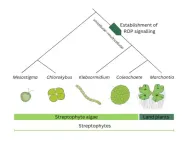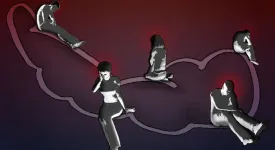(Press-News.org) Melting of glaciers, rising sea levels, extreme heat waves: the consequences of climate change are more visible than ever, and the scientific community has confirmed that humans are responsible. Yet studies show that a third of the population still doubts or disputes these facts. The cause is disinformation spread by certain vested interests. To try and prevent this phenomenon, a team from the University of Geneva (UNIGE) has developed and tested six psychological interventions on nearly 7,000 participants from twelve countries. The research, published in the journal Nature Human Behavior, highlights the extremely persuasive nature of disinformation and the need to strengthen our efforts to combat it.
Fighting disinformation about climate change is a major challenge for society. Although scientific consensus on human responsibility - reaffirmed by the sixth report of the Intergovernmental Panel on Climate Change (IPCC) - has been in place for decades, a third of the population still doubts or disputes it. This phenomenon can be explained by the disinformation spread by certain companies and lobbies over the last 50 years.
‘‘For instance, these messages can take the form of an unfounded questioning of the scientific consensus or an overestimation of the socio-financial burden of climate policies,’’ explains Tobia Spampatti, a PhD Student and Teaching and Research Assistant in the Consumer Decision and Sustainable Behavior Lab (CDSB Lab) at the Faculty of Psychology and Educational Sciences and at the Swiss Center for Affective Sciences of the UNIGE.
Many psychological factors
This phenomenon weakens the support of a part of the population for climate policies. To combat this, Tobia Spampatti and researchers from the UNIGE developed a theoretical framework to describe the formation and updating of (anti)scientific information. This framework, built on previous theoretical takes on the psychology of misinformation (Philippe Mueller et al. and Ulrich Ecker et al. in 2022), takes into account the source of the message, its content, its recipients, and the psychological factors that can influence their processing. This theoretical framework aims to identify the entry points for disinformation to access a person’s ‘‘psyche’’, and can be used to intervene and block, or encourage, people to accept information.
‘‘As individuals, we do not process scientific messages as neutral receivers of information, but by weighing them up against our prior beliefs, desired outcomes, emotional ties and socio-cultural and ideological backgrounds. Depending on the configuration of these psychological factors, anti-scientific beliefs can be amplified and become resistant to correction,’’ explains Tobia Spampatti, first author of the study.
Six preventive strategies put to the test
On this basis, the researchers developed six psychological intervention strategies aimed at preventing climate disinformation from affecting people’s climate-related beliefs and behaviors. They were tested on 6,816 participants in twelve different countries. Each strategy was linked to a particular theme (scientific consensus, trust in climate scientists, transparent communication, moralizing climate action, accuracy, positive emotions towards climate action). The participants were divided into eight groups: six subjected to one of these strategies, one to disinformation without prevention, and a control group.
The ‘‘trust in climate scientists’’ group, for example, received verified information demonstrating the credibility of IPCC scientists. The “transparent communication” group, meanwhile, was presented with information on both the advantages and the disadvantages of climate mitigation actions. Each group was then exposed to twenty pieces of false or biased information, ten on climate science and ten on climate policy. The UNIGE scientists then measured their impact after these preventive interventions by asking the participants about their feelings regarding climate mitigation actions.
Low preventive effect
‘‘We found that the protective effect of our strategies is small and disappears after the second exposure to disinformation. Climate disinformation used in this study has a negative influence on people’s belief in climate change and their sustainable behaviour’’, says Tobias Brosch, Associate Professor in the CDSB Lab at the Faculty of Psychology and Educational Sciences and at the Swiss Center for Affective Sciences in the UNIGE, and final author of the study. ‘‘Disinformation is therefore extremely persuasive, seemingly more so than scientific information. Only the ‘accuracy’ group, who were asked to think in depth about the accuracy of the information they encountered online, showed a slight advantage’’.
‘‘Research in this field is still in its infancy. We are therefore going to continue our work and look for more effective forms of intervention. It is becoming increasingly urgent to combat this phenomenon, which is delaying the implementation of certain urgent climate change mitigation measures,’’ concludes Tobia Spampatti.
END
Climate: why disinformation is so persistent
A UNIGE team has tested six psychological interventions to combat climate misinformation. It shows how difficult it is to combat these messages, which are resistant to scientific information
2023-11-30
ELSE PRESS RELEASES FROM THIS DATE:
Early body contact develops premature babies' social skills
2023-11-30
Skin-to-skin contact between parent and infant during the first hours after a very premature birth helps develop the child's social skills. This is according to a new study published in JAMA Network Open by researchers from Karolinska Institutet and others. The study also shows that fathers may play a more important role than previous research has shown.
In current practice, very premature babies are usually placed in an incubator to keep them warm and to stabilize them during the first hours after birth. In the “Immediate parent-infant skin-to-skin study” (IPISTOSS), 91 premature babies born at 28 to 33 weeks were randomized to either ...
ROP signaling: Origin at dawn of multicellular plant life
2023-11-30
Plants regulate their development with a distinct group of molecular players. ROP proteins, a group of plant-specific proteins, are known to control plant tissue formation. Now, Hugh Mulvey and Liam Dolan at the GMI show that ROP proteins evolved at the transition between unicellular and multicellular plant life. The findings are published on November 30 in the journal Current Biology.
Being non-mobile, plants follow a very different lifestyle from us animals. To grow and develop, plants also need a distinct ...
Twin research indicates that that a vegan diet improves cardiovascular health
2023-11-30
In a study with 22 pairs of identical twins, Stanford Medicine researchers and their colleagues have found that a vegan diet improves cardiovascular health in as little as eight weeks.
Although it’s well-known that eating less meat improves cardiovascular health, diet studies are often hampered by factors such as genetic differences, upbringing and lifestyle choices. By studying identical twins, however, the researchers were able to control for genetics and limit the other factors, as the twins grew up in the same households ...
A mineral produced by plate tectonics has a global cooling effect, study finds
2023-11-30
MIT geologists have found that a clay mineral on the seafloor, called smectite, has a surprisingly powerful ability to sequester carbon over millions of years.
Under a microscope, a single grain of the clay resembles the folds of an accordion. These folds are known to be effective traps for organic carbon.
Now, the MIT team has shown that the carbon-trapping clays are a product of plate tectonics: When oceanic crust crushes against a continental plate, it can bring rocks to the surface that, over ...
Age disparities in prevalence of anxiety and depression among adults during the pandemic
2023-11-30
About The Study: In this study of 3 million U.S. adults, anxiety and depression were significantly higher among adults ages 18 to 39 compared with adults age 40 and older during the COVID-19 pandemic. Less favorable economic conditions and responses to social upheaval may have contributed to young adults’ worse mental well-being. These findings suggest a need for greater mental health care and economic policies targeted toward younger adults.
Authors: Sarah Collier Villaume, Ph.D., of Northwestern University in Evanston, ...
Structural racism and lung cancer risk
2023-11-30
About The Study: The findings of this study suggest that structural racism must be considered as a fundamental contributor to the unequal distribution of lung cancer risk factors and thus disparate lung cancer risk across different racial and ethnic groups. Additional research is needed to better identify mechanisms contributing to inequitable lung cancer risk and tailor preventive interventions.
Authors: Sidra N. Bonner, M.D., M.P.H., M.Sc., of the University of Michigan in Ann Arbor, is the corresponding author.
To access the embargoed study: Visit our For The Media website ...
Traumatic memories are represented differently than regular sad memories in the brains of people with PTSD, new research shows
2023-11-30
A new analysis of the brain activity of people with post-traumatic stress disorder (PTSD) is the first to reveal that traumatic memories are represented in the brain in an entirely different way than sad autobiographical memories.
This finding supports the notion that traumatic memories in PTSD are an alternate cognitive entity that deviates from regular memory, and may provide a biological explanation for why the recall of traumatic memories often displays as intrusions that differ profoundly from “regular” negative memories for patients with PTSD.
The study, ...
Study reveals distinct brain activity triggered by memories of trauma
2023-11-30
New Haven, Conn. — It is well known that people who have lived through traumatic events like sexual assault, domestic abuse, or violent combat can experience symptoms of post-traumatic stress disorder (PTSD), including terrifying flashbacks, severe anxiety, and uncontrollable thoughts about the incident. But what exactly happens in the brains of PTSD patients as they recall these traumatic events? Are they remembered the same way as, say, the loss of a beloved pet — or, for that matter, a relaxing walk on the beach?
A new study co-led by Yale researchers finds that the brain activity triggered by recollections of traumatic experiences ...
Armed to the hilt: Study solves mystery behind bacteria’s extensive weaponry
2023-11-30
New study tackles the mystery of why bacteria often carry diverse ranges of weapons.
The findings show that different weapons are best suited to different competition scenarios.
Short-range weapons help bacteria to invade established communities; long-range weapons are useful once established.
A new study led by the University of Oxford has shed light on why certain species of bacteria carry astonishing arsenals of weapons. The findings, published today in the journal Nature Ecology & Evolution, could help us to engineer microbes that can destroy deadly pathogens, reducing our reliance on antibiotics.
Many species of bacteria possess ...
Gladstone team uncovers why maternal diabetes predisposes babies to heart defects
2023-11-30
SAN FRANCISCO—November 30, 2023—When women with diabetes become pregnant, they face not only the typical challenges of pregnancy and impending parenthood, but also a scary statistic: they’re five times more likely to have a baby with a congenital heart defect.
Researchers at Gladstone Institutes have now discovered why that is, identifying the cells and molecules that go awry in the developing hearts of fetuses in women with diabetes. They found that a small subset of cells destined to become part of the heart’s aorta and pulmonary artery have unusually high levels of retinoic acid activity, which coaxes them to behave more like cells found ...
LAST 30 PRESS RELEASES:
Night lights can structure ecosystems
A parasitic origin for the ribosome?
A gold-standard survey of the American mood
Tool for identifying children at risk of speech disorders
How Japanese medical trainees view artificial intelligence in medicine
MambaAlign fusion framework for detecting defects missed by inspection systems
Children born with upper limb difference show the incredible adaptability of the young brain
How bacteria can reclaim lost energy, nutrients, and clean water from wastewater
Fast-paced lives demand faster vision: ecology shapes how “quickly” animals see time
Global warming and heat stress risk close in on the Tour de France
New technology reveals hidden DNA scaffolding built before life ‘switches on’
New study reveals early healthy eating shapes lifelong brain health
Trashing cancer’s ‘undruggable’ proteins
Industrial research labs were invented in Europe but made the U.S. a tech superpower
Enzymes work as Maxwell's demon by using memory stored as motion
Methane’s missing emissions: The underestimated impact of small sources
Beating cancer by eating cancer
How sleep disruption impairs social memory: Oxytocin circuits reveal mechanisms and therapeutic opportunities
Natural compound from pomegranate leaves disrupts disease-causing amyloid
A depression treatment that once took eight weeks may work just as well in one
New study calls for personalized, tiered approach to postpartum care
The hidden breath of cities: Why we need to look closer at public fountains
Rewetting peatlands could unlock more effective carbon removal using biochar
Microplastics discovered in prostate tumors
ACES marks 150 years of the Morrow Plots, our nation's oldest research field
Physicists open door to future, hyper-efficient ‘orbitronic’ devices
$80 million supports research into exceptional longevity
Why the planet doesn’t dry out together: scientists solve a global climate puzzle
Global greening: The Earth’s green wave is shifting
You don't need to be very altruistic to stop an epidemic
[Press-News.org] Climate: why disinformation is so persistentA UNIGE team has tested six psychological interventions to combat climate misinformation. It shows how difficult it is to combat these messages, which are resistant to scientific information


